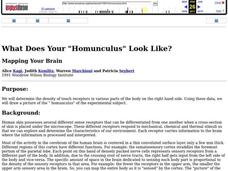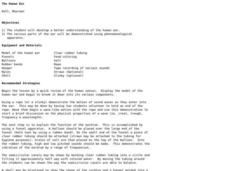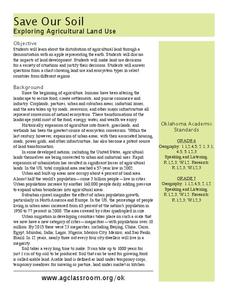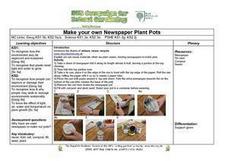Curated OER
What Does Your "Homunculus" Look Like?
Students investigate the density of touch receptors in various parts of the body. They discover how the body senses various stimuli, then maps a picture of the "homunculus" of the experimental subject.
Curated OER
DNA Model
Students are able to construct a candy model of DNA. They are able to list all of the parts of DNA that they investigated earlier. Students are able to describe what each part of DNA does. They create an edible model of DNA strands.
National First Ladies' Library
History of Women in Sports
Learners examine online or hard copy timelines of athletics, discuss what they like and dislike about time tables they have reviewed, research in small groups history of basketball, baseball, gymnastics, or track and field, and create...
Curated OER
Cell Parts
In this biology worksheet, students read about the parts of both plant and animal cells and examine cell diagrams. They read about the function of cell parts before answering 11 online fill in the blank questions.
Curated OER
Fractions and Panes
Students recognize the fractional values of window panes as part of the whole window. In this window panes lesson, students listen to a story about window panes and sing a song. Students look at pictures of windows and write fractions...
Curated OER
The Measurement Man
Students explore the measurements of capacity by constructing a creative project in the shape of a man. The man has body parts that represent different units of measurement and can be used to make conversions. This is highly concrete and...
Curated OER
Earth Structure and Materials
Students explain what is meant by term nuclear radiation, describe in detail electromagnetic spectrum, differentiate between ionizing and non-ionizing radiation, understand half-life of isotopes, differentiate between processes of...
Curated OER
Chem 152-Electrochemistry
In this electrochemistry worksheet, learners solve a variety of problems including identifying parts of oxidation and reduction reactions, writing balanced equations for galvanic cells, determining free energy and equilibrium constants...
Curated OER
Polar Energy
Learners define and read an article on polar energy. In this polar energy lesson plan, students answer questions about the article. Learners participate in activities related to isotopes, half-life and radiocarbon. ...
Curated OER
Creating Craters
Students explore parts of an impact crater and compare and contrast craters found in Earth, the Moon, and Mars. Crater formation is modelled and the relationship of mass, velocity, and size of the projectile to the crater formation is...
Curated OER
Those Busy, Buzz'n Worker Bees
Students research information on worker bees. In this insect lesson, students review the body parts of insects and how bees find flowers. They discuss compound and simple eyes and the life cycle of a worker bee.
Curated OER
Philanthropic Behavior/ Cooperative Learning
Students increase listening comprehension and use critical thinking skills to make a picture. In this philanthropic behavior lesson, students draw pictures in three parts. Each part is drawn by another students. Students share their...
Curated OER
The Digestive System
High schoolers review the the major organs of the digestive system and the function of each. They name some of the problems of the digestive system covered in the video. Students are challenged to link each condition with the...
Curated OER
Brain Power
In this science worksheet, students investigate the anatomy and function of the human brain. Students read facts about the parts of the brain and what each does. Students compare the size of the human brain to that of other animals....
Curated OER
High or Low
In this wave properties instructional activity, students will experiment to see how the sound made by vibrating a ruler is affected by the length of the part that is vibrating. Then students will answer 5 questions based on the results...
Curated OER
The Human Ear
Students explore the human ear. In this biology lesson plan, students develop a better understanding of the various parts of the human ear as they explore a hands-on apparatus.
Curated OER
What Causes Tooth Decay
Students investigate oral hygiene. In this personal health lesson plan, students discover the parts of a tooth and how to best protect them from disease. Students examine the effects of acids on tooth enamel and calcium.
Curated OER
Sweet 16 Cell Biology Tournament
In this cell structures worksheet, students review the parts of a cell using a "tournament" with brackets. They follow rules for each bracket to determine which cell structures "advance" to the next round.
Curated OER
Can You Hear Me Now? A Study Unit on Cell Phones
In this comprehensive reading comprehension lesson, students complete an indepth look at the introductions and history of cell phones. Students research, analyze and determine the answers to twenty two questions regarding what a cell...
Curated OER
Civil Rights through Photographs
Learners examine why racial tensions continued after laws were put into place to try and create equal treatment. In this two part Civil Rights activity, students explored the causes of the movement through photography and a...
Curated OER
Probability Experiment
Students do an experiment with probability. In this probability lesson, they listen to part of the book G is for Googol: A Math Alphabet Book by David M. Schwartz. They complete 3 probability experiments and check to see how close...
Curated OER
Save Our Soil
Students read about the history of soil and complete language arts, math, social studies, and more activities about soil. In this soil lesson plan, students complete fraction problems, create a school compost pile, write about conserving...
Curated OER
Make Your Own Newspaper Plant Pots
Students make plant pots out of newspaper as part of a recycle, reuse, and reduce lesson. In this recycling lesson, students fold a piece of newspaper to make a pot in which to start plants. They fill it with compost and plant seeds.
Math Mammoth
Equivalent Fractions
In this equivalent fractions worksheet, students learn to find equivalent fractions using shaded parts of a whole. Students complete several equivalent fractions using the shaded figures.
Other popular searches
- Fractional Parts of a Whole
- Fractional Parts to Whole
- Fractional Parts of Sets
- Estimating Fractional Parts
- Measuring Fractional Parts
- Examples of Fractional Parts
- Fractional Parts of a Set
- Fractional Parts in Reading
- Fractional Parts of Numbers
- Identifying Fractional Parts
- Fractional Parts of a Group
- Fractional Parts Odd Numbers























